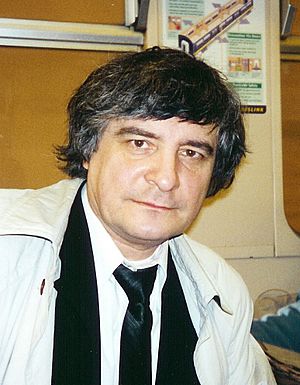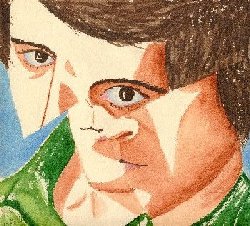Dmitri Smirnov (composer) facts for kids
Quick facts for kids
Dmitri Smirnov
|
|
|---|---|
| Дми́трий Смирно́в | |
 |
|
| Born |
Dmitri Nikolaevich Smirnov
2 November 1948 |
| Died | 9 April 2020 (aged 71) Watford, England
|
| Occupation |
|
| Spouse(s) | |
| Children | 2 |
Dmitri Nikolaevich Smirnov (Russian: Дми́трий Никола́евич Смирно́в; born 2 November 1948 – died 9 April 2020) was a famous composer and teacher. He was born in Russia but later lived in Britain. He also used the names Dmitri N. Smirnov and D. Smirnov-Sadovsky for his work.
Smirnov wrote many different kinds of music. These included operas (musical plays), symphonies (large pieces for orchestra), and string quartets (music for four string instruments). He also wrote vocal music, from songs to oratorios (large musical works for voices and orchestra). Many of his musical pieces were inspired by the art and poems of William Blake, a famous English poet and artist.
Contents
His Life and Work
Dmitri Smirnov was born in Minsk. His parents were opera singers. His family moved around a lot when he was young, living in Ulan-Ude and Bishkek. He spent most of his childhood in Bishkek.
He studied music at the Moscow Conservatory from 1967 to 1972. There, he learned about composing, how to arrange music for different instruments, and how to analyze music. He also had private lessons with Philip Herschkowitz, who was a student of a very famous composer named Anton Webern.
From 1973 to 1980, Smirnov worked as an editor for a music publishing company. After that, he decided to become a full-time composer. In 1976, he won first prize for his piece Solo for Harp at a competition in the Netherlands. This award helped him become known around the world.
In 1979, Smirnov faced some challenges. He was put on a list of composers who were not approved by the government. This happened because he took part in some music festivals in Western countries without permission.
In 1990, Smirnov helped start a new group in Moscow called the ACM - Association for Contemporary Music. This group supported new and modern music in Russia.
In 1991, he moved to England. He became a special composer at St John's College, Cambridge and at Dartington. He also taught as a visiting professor at Keele University from 1993 to 1998. From 2003, he taught at Goldsmiths College at the University of London.
Music Inspired by William Blake
Many of Smirnov's musical works show how much he loved the poems and art of William Blake. For example, he wrote a group of songs called a song cycle based on Blake's poem The Season in 1979. This song cycle later became his first symphony, which he called The Seasons.
He also wrote two operas based on Blake's texts: Tiriel and Thel. These operas were first performed in 1989. Tiriel was shown at a festival in Germany, and Thel was performed in London. His First Symphony was also first played that same year at the Tanglewood Festival and the Southbank Centre in London.
Some of his other important premieres include:
- His orchestral piece Mozart-Variations was turned into a ballet in Germany in 1992.
- The oratorio A Song of Liberty was performed in Leeds in 1993 by the BBC Philharmonic orchestra.
- His Cello Concerto was played in Manchester in 1996.
- The cantata Song of Songs was performed in Geneva in 2001.
- His Triple Concerto No. 2 for violin, double bass, and harp was performed in London in 2004.
Many famous conductors have performed Smirnov's music. These include Riccardo Muti, Sir Andrew Davis, Dennis Russell Davies, and Peter Eötvös. He also composed music for well-known groups like the London Sinfonietta and the Brodsky Quartet.
Personal Life
Dmitri Smirnov was married to another composer, Elena Firsova. They moved to the United Kingdom in 1991. From 1998, they lived in St Albans near London.
They had two children: Philip Firsov, who is an artist and sculptor, and Alissa Firsova, who is also a composer, pianist, and conductor. Dmitri Smirnov passed away on 9 April 2020 in Watford.
His Works
Smirnov's music was published by well-known companies like Hans Sikorski in Germany and Boosey & Hawkes in London. Here are some of his many compositions:
- Piano Sonatas: No. 1 (1967), No. 2 (1980), No. 3 (1992), No. 4 String of Destiny (2000), No. 5 (2001), No. 6 Blake-Sonata (2008)
- Violin Sonatas: No. 1 (1969), No. 2 (1979), No. 3 "es ist .." (1998), No. 4 (2005)
- Piano Concertos: No. 1 (1971), No. 2 (1978)
- Eternal Refuge for voice and piano trio (1972)
- String Quartets: No. 1 (1974), No. 2 (1985), No. 3 (1993), No. 4 (1993), No. 5 (1994), No. 6 (1998), No. 7 (2005), No. 8 Inferno (2007)
- Clarinet Concerto (1974)
- Pastorale for orchestra (1975)
- Mirages for saxophone quartet (1975)
- Solo for Harp (1976)
- The Sorrow of past Days for voice and instruments (1976)
- Triple Concerto No. 1 (1977)
- Piano Trios: No. 1 (1977), No. 2 (1992), No. 3 "Tri-o-Tri" (2005)
- Cello Sonata (1978)
- The Seasons, song cycle (1979)
- Symphony No. 1 The Seasons (1980)
- Symphony No. 2 Destiny (1982)
- The Night Rhymes cantata (1982)
- Tiriel, opera (1983–1985)
- Thel, chamber opera (1986)
- Mozart-Variations for orchestra (1987)
- The Visions of Coleridge for voice and players (1987)
- Songs of Love and Madness for voice and instruments (1988)
- The Seven Angels of William Blake for piano (1988)
- Blake’s Pictures (ballet pieces): The Moonlight Story (1988), Jacob's Ladder (1990), Abel (1991), The River of Life (1992)
- Eight-line Poems for voice and instruments
- Violin Concertos: No. 1 (1990), No. 2 (1995), No. 3 (1996)
- A Song of Liberty, oratorio (1991)
- Piano Quintet (1992)
- Cello concerto (1992)
- Ariel Songs for voice and instruments (1993)
- The Guardians of Space for orchestra (1994)
- Symphony No. 3 Voyages (1995)
- The Music of the Spheres for piano (1995)
- The Bride in her Grave, opera (1995)
- Elegy in memory of Edison Denisov (1997)
- The Bird of Time for orchestra (1997)
- Song of Songs, cantata (1997)
- Between Scylla and Charybdis for string orchestra (1997)
- Mass for mixed chorus (1998)
- Opus 111 for clarinet, cello & piano (1998)
- Twilight for soprano and players (1998–2000)
- Portrait in memory of Dmitri Shostakovich (1999)
- Concerto Piccolo for cello and orchestra (2001)
- Innocence of Experience for tape (2001)
- Metaplasm No. 1 and No. 2 for piano (2002)
- Triple Concerto No. 2 for violin, harp, double bass and orchestra (2003)
- Dream Journey for voice and instruments (2003–2004)
- Red Bells for piano and ensemble (2005)
- Requiem for soloists, chorus and orchestra (2006)
- Amore sola for solo violin (2006)
- Proverbs of Hell for voice and piano (2006)
- The Lonely Wanderer for voice and cello (2007)
- Duo in Green for 2 violins (2008)
- Space Odyssey for large orchestra (2008)
- From the Pine to the Moon for voice and cello (2009)
- The Book of Constellations for ensemble (2009–)
- The Last Trumpet for trumpet and timpani (2010)
- Kubla Khan: A Vision in a Dream for tenor (or soprano), bajan, violin and cello (2010/2011)
- Zodiac for orchestra (2010–2013)
- Canisi-Variations for violin and piano (2011)
- Papageno-Variations for orchestra (2012)
- Visionary Heads for piano (2013)
- Farewell. In Memory of Alexander Ivashkin. For solo cello (2014)
- Pro et contra, two pieces for viola and piano (2014)
- The Silly Moon, 8 haiku for voice and piano (2014)
- Solo for Viola (2014)
- The China Travel, 20 songs for voice and piano (2014)
- Four Eight-line Poems for voice and piano (2014)
Recordings
Many of Dmitri Smirnov's works have been recorded. Here are some of the albums where you can hear his music:
- Fish Ear FECD621. Peter Sheppard, Violin: Winter Journey / Smirnov: partita
- Megadisc MDC 7818. an Introduction to Dmitri Smirnov. Elegy, String of Destiny, Es ist…, Piano Trio 1, Cello sonata, Postlude
- Metier MSV CD92028. Peter Sheppard, Violin: Etude Philharmpnique / Smirnov: Two Fugues
- Mobile Fidelity MFCD 906. Works by Modern Composers of Moscow / Smirnov: Solo for Harp
- Olympia OCD 282. Moscow Contemporary Music Ensemble, Vol.2 / Smirnov: Sonata for fl and harp
- Conifer 75605 51252-2 , reissued on RCA/Catalyst 82876 64283-2. Chilingirian Quartet / Smirnov: Second Quartet
- Vanguard Classics 99154. Aurelia Saxophone Quartet: Four generations of Russian composers / Smirnov: Fantasia
- Vanguard Classics 99212. Brodsky Quartet: Beethoven Op18 and six more / Smirnov: Quartet 6
- NBE CD 021 Nederland Blazers Ensemble: La ligubre gondola & Legende No. 2 / Liszt/Smirnov
- Vista Vera VVCD-00232 by Lev Mikhailov and partners / Smirnov: Mirages for saxophone quartet
- Visto: 2121 CD – Proyecto Mockba / Smirnov: Serenade op. 34, para obeo, saxofón alto y violonchelo. Tiriel op. 41b, para saxofón barítono y piano
- Meridian CDE 84586: Primrose Piano Quartet / Smirnov Piano Quintet;
- Vivat: 109: Russian Émigrés – Alissa Firsova, piano / Smirnov: Sonata No. 6 "Blake Sonata", Op. 157 (2008)
See also
 In Spanish: Dmitri Smirnov (compositor) para niños
In Spanish: Dmitri Smirnov (compositor) para niños
 | Audre Lorde |
 | John Berry Meachum |
 | Ferdinand Lee Barnett |


